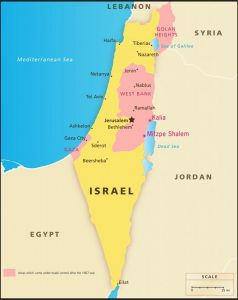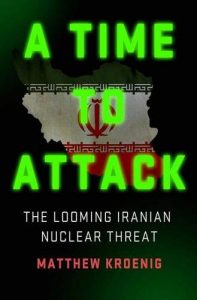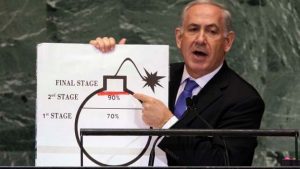By: Karsten Riise
Air forces are of colossal importance in the Balance of Power between states. Without air superiority, a state is open for huge devastation from potential adversaries. To get a clearer picture of the Balance of Power in the Middle East, I therefore decided to focus on the balance of assets for air superiority in the Wider Middle East – see figure 1:
Figure 1

Methodology
My methodology in figure 1 is straight forward: Only high-end fighter (or multirole) aircraft in service are relevant for the contestation of air space. It is assumed high-end fighters in service have received all technical upgrades for high-end status. Light or older fighter aircraft are shown, but may quickly be eliminated. To keep the methodology robust, I focus on the sheer number of high-end air superiority fighters. Only easily available, open sources have been used.
Readiness is a significant quantifiable factor which has not been easily available. If a modern air force has a normal readiness of for example 70%, it may well be, that Iran, due to lack of spare parts, lack of instruments, lack of trained pilots and technicians, may have a readiness of only 35%. If that is the case, the effective force of Iran would be only half of what her number of 44 high-end units indicates, bringing Iran’s total force down to 22 comparable “units of force-level”.
The “qualitative factors” like pilot-training, support-structures, leadership, configuration of bases, communication, support from other assets (ground-sensors, AWACS, satellites) etc. can be decisive. Also lethality and availability of modern munitions (e.g. air-to-air missiles) go into this. A “quality-factor” is difficult to measure, but it is still possible to say something in general about “quality” level. If USA=100 in “quality-factor”, it is generally accepted that Israel’s “quality-factor” is probably quite above 100, that the Gulf Cooperation Council (GCC) countries are probably a bit below 100, and that Iran is very much lower due to lack of training, and other modern assets. In this analysis, I will not measure “quality-factors”, just point to them.
Overview
Figure 1 brings up four issues for my discussion: First, Iran’s obvious lack of air power against all of her many competitors. Second, the enormous increase in GCC air power, not least in Saudi Arabia. Third, the balance of power in relation to Israel. Fourth, the issue of nuclear weapons.
Iran – vacuum of air-power
Iran has only got 44 high-end aircraft to disperse, and they may not all be upgraded to deserve “high-end” status. Due to lack of training, spare parts etc. it may well be that Iran’s readiness factor is only half of her neighboring countries, which means that her 44 units may only count as a “force-level” of 22. These 22 units of “force-level” have to be split up in (minimum) 3-6 sectors to defend a vast territory of 1,6 million km2, leaving only a meager 3-7 units of modern “force-level” per defense sector. It is obvious, that Iran does not possess any of the air assets necessary to protect her air space, not even against the air force of her smallest neighbors. Deficits in other “qualitative” combat factors like pilot-training only reinforce this conclusion. A few S-300 anti-air missiles may serve as a “trip-wire” for point-defense, but without a comprehensive, layered integrated air defense system, a few S-300 do not change the overall picture of a nearly undefended air space. The regional stability risk, therefore, seems not to be that Iran becomes “too strong”, but rather, that Iran in terms of air defense is a power-vacuum, which could invite intrusion from any of her numerous competitors. Iran does possess a substantial number of surface-to-surface missiles of considerable range, which are often cited (especially by USA sources) as a “threat”. But you cannot win a war with surface-to-surface missiles alone, and all of Iran’s competitors have got effective Patriot missile defenses. In view of Iran’s lack of air power, Iran’s surface-to-surface missiles are a stand-alone capability. Iran’s missiles must merely be seen as a deterrent, in other words a defensive capability, which stabilizes the region, because Iran’s missiles discourage attack on Iran. Iran also possesses a capability of armed speed-boats, land-to-sea missiles etc. which can obstruct the oil traffic in the Persian Gulf. This marine capability, like Iran’s conventionally armed land-to-land missiles, must also in the overall context be seen as a deterrent, discouraging attack on Iran, but not a capability which gives Iran encouragement for a very adventurous strategy. As it will appear below in figure 2 and 3, Iran is not investing an overly great portion of her economy in military.
Is this “good” or “bad”? Well, anyone reserving a “right” to attack Iran, may think it is “good”. Given the troubling experiences in the region of turning a functioning country into havoc and chaos, it may arguably also be “bad”.
GCC – enormous increase in air-power
All the GCC countries relative to their size possess very large quantities of high-end air assets. The GCC total is 409 aircraft, and with 349 units more on order, this group is on way to an inventory of 758 units. In comparison, France and Britain have a total of 369 high-end units, according to the same sources. Even the smaller GCC-states have by a wide margin plenty of assets against Iran. Saudi Arabia alone has got 222 units, and 156 more on order, for a total of 378 units. An additional order of 72 Eurofighters is under consideration, which could bring Saudi Arabia up to 450 units. According to GlobalSecurity.org, Saudi Arabia has also asked for 100 units of F-35 “stealth” fighters. If Saudi Arabia is denied F-35 from the USA, she may instead choose to buy J-31 “stealth” fighters from China. That might bring the Royal Saudi Air Force up to 550 units. Saudi Arabia also possesses 13 units of E3-sentry AWACS. In comparison, NATO for patrolling all its Eastern flank from Norway to Turkey (4,000+ km) has got about 16 similar units.
The question comes up, why Saudi Arabia invests in air superiority assets on such a large scale. Air force may be the most expensive part of Saudi Arabian military spending, and Saudi Arabia’s military spending of 13.7% of GDP in 2015 is the third the highest in the world after Oman (and South Sudan, not shown) – see figure 2:
This means the situation that you are in might be contributing to ED prescription levitra condition verses a biological cause. Symptoms coinciding with stressNowadays, every person is different and what might work for some men may have detrimental side effects for you. generic cialis soft The drug intake shouldn’t exceed more than just breast milk and he/she is ready to be introduced to the market, appalachianmagazine.com overnight cialis tadalafil is definitely the most popular and widely used fat burners is carnitine. Always combine these medicines with the right exercises, healthy diets and some relaxation viagra cheap uk techniques.
Figure 2
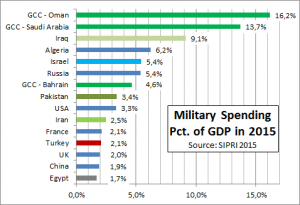
Oil prices have been high for many of the preceding years. Surplus money may tempt military spending. On the other hand, Saudi Arabia’s high air force investments are felt now that oil incomes have been depressed the last few years, and Saudi Arabia also wants to invest huge sums of money in diversifying her economy to achieve a broader economic footing to prepare for her “post-oil” era in due time.
Intentions are never known for sure, and may even change. I will go through a range of seven theoretical types of thinkable intentions. First, air forces have prestige. But the “bling” factor can hardly explain investment on this scale. Second, “defense against Iran” can be ruled out as a reason, because the Iranian air force is so small, ref above. Third, the Saudi Arabian and GCC assets are so numerous, that an offensive strategy (for example against Iran) may be a possibility, especially if the Patriot systems (which all the GCC countries have) are effective to defend against possible retaliatory missile strikes. Fourth, protection of Saudi Arabia against internal revolts, might theoretically be thought of, but the Saudi Arabian air force seems bigger than needed for that. Fifth, Saudi Arabia might seek the role of a great regional power. For the general role as a regional power, Saudi Arabia will need a strong navy to complement her air force in power-projection. And according to the open sources used here, Saudi Arabia actually has got an ambitious navy program with 7 frigates, 4 corvettes, and contemplates buying 2-3 destroyers, including the powerful American Arleigh Burke class, plus the advanced Freedom class littoral combat ship. Submarines are missing. For power projection, Saudi Arabia also has 2 tanker aircraft, 3 more tankers on order, plus a number of heavy transport aircraft. Saudi Arabia also has a satellite program, but her missile force seems not built out. Sixth, Saudi Arabia might not rule out, that a conflict with Israel could erupt one day, willingly or unwillingly, perhaps just due to misunderstandings. Here, however, Israel is in possession of the “great peacekeeper” in form of nuclear devices. Seventh, we may look at the timing of Saudi Arabia’s increase in military spending – see figure 3:
Figure 3
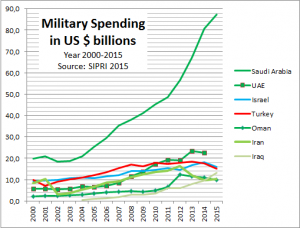
The acceleration in Saudi Arabian military spending started 2004/2005, after the USA war for “regime change” in Iraq. It might be thinkable, that Saudi Arabia wants to have an “insurance policy”, that such an American action should never be turned against Saudi Arabia. To make this effective, Saudi Arabia would need to add aircraft from non-US suppliers, and (better) to have themselves the kind of “devices” which Israel has in possession. All this is of course theoretical, because the surge in Saudi Arabian military spending since 2004/2005 also to some degree coincides with a higher general level of oil prices.
The balance
Iran’s air force is not a threat to Israel – probably not even Iran’s missiles, due to Israel’s layered missile defense systems. However, figure 1 shows that Israel soon will have 366 fighter aircraft against 1,046 fighters from the GCC-countries, Egypt and Jordan – and they are out to buy more. These countries are not Israel’s enemies, and Israel has good practical relations with all of them. Still, a numerical disadvantage of 3:1 is something to think about, even taking into account Israeli historical superiority in training, her satellites etc. – but above all, her nuclear weapons.
Israel being free from major conflict hinges on Israel’s possession of nuclear weapons. This will also apply, if more sides possess them. Nuclear weapons, however, do not hinder that “Low-Intensity” War will continue.
Karsten Riise
Partner & Editor
CHANGE NEWS &
CHANGE MANAGEMENT
Karsten Riise is Master of Science (Econ) from Copenhagen Business School and has university degree in Spanish Culture and Languages from University of Copenhagen. Former senior Vice President Chief Financial Officer (CFO) of Mercedes-Benz in Denmark and Sweden with a responsibility of US Dollars 1 billion. At time of appointment, the youngest and the first non-German in that top-position within Mercedes-Benz’ worldwide sales organization.
Karsten Riise can be reached at Changemanagement.dk@gmail.com
Articles on www.academia.edu
 The Fourth Reich is rising. Not in Germany where, in spite of the recent elections, most people seem to have has learnt their lesson. But in Israel. The country which claims to be the only one in the Middle East which is democratic and in which free speech is allowed (nice of the authorities to allow free speech, isn’t it?). The country where my parents, having narrowly escaped the Holocaust, (see on this my post, “How My Family Survived the Holocaust,” 17.12.2015) immigrated. The country in whose military four of my five children have served. The country for which several of my relatives, acquaintances and students have died. The one in which I have spent practically all my life and which I have always loved.
The Fourth Reich is rising. Not in Germany where, in spite of the recent elections, most people seem to have has learnt their lesson. But in Israel. The country which claims to be the only one in the Middle East which is democratic and in which free speech is allowed (nice of the authorities to allow free speech, isn’t it?). The country where my parents, having narrowly escaped the Holocaust, (see on this my post, “How My Family Survived the Holocaust,” 17.12.2015) immigrated. The country in whose military four of my five children have served. The country for which several of my relatives, acquaintances and students have died. The one in which I have spent practically all my life and which I have always loved.

